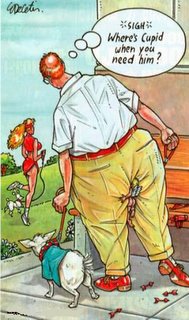Laughing At Children's Love
“At least I have never made the mistake of laughing at children’s love. It has a terrible inevitability of separation because there can be no satisfaction.”
– Graham Greene, “The Innocents”
“The Innocents” is a story of Graham Greene’s about a very young boy who loves a very young girl. She has her piano lessons at the same place he does, and every week he lives for seeing her... or something. Mostly, I forget. I read the story ages ago; all I have to go on now are a few bits I liked and wrote down at the time. The details escape me.
From my notes, I know that the narrator says, “I remembered the small girl as well as one remembers anyone without a photograph to refer to... I remembered all the games of blind-man’s bluff at birthday parties when I vainly hoped to catch her, so that I might have the excuse to touch and hold her, but I never caught her; she always kept out of my way.”
When I was in second grade, I loved a small girl named Becky. I say, “loved,” because love, I believe, is the emotion I felt. I have never understood the people who say that children’s love is misguided, confused, or somehow invalid. To these people, apparently, a few more years of existence have afforded adults an intrinsic understanding of love: they can define it in absolute terms and just as easily identify its false incarnations.
I remember once, in the second grade, lining up for the bus to go somewhere, a field trip to some farm or museum, and hoping desperately that I would by some miracle end up in the seat next to Becky. What I felt in the moments leading up to boarding the bus was wrenching. I stood near the back of the line. Becky was near the front. There were maybe twenty of our classmates between us. Mrs. Anderson stood at the bus doors with her clipboard, checking kids off her list, giving them their seat assignment according to a trouble-mitigating plan, and letting them board the bus, one at a time.
Becky was small. She was small, and I remember her as beautiful. Now, at twenty-nine, I would try not to consider a six year-old child “beautiful,” because it would be creepy. I might call them “cute” or “tow-headed,” whatever that means. “Beautiful” innately construes desire – if not sexual desire, then at least that feeling of needing deeply to be with someone, of longing if not lust. Even now, I think of six year-old Becky and she remains in my memory: beautiful.
I remember, also, being afraid of Becky. I was torn between wanting to be with – or just near – her, and also to run away. She made a storm rage up in my belly; she was electrifying. In class, she sat behind me and to the left – close enough to reach back and touch, if I dared. I would glance fleetingly over my shoulder at her from time to time. If she caught me, something prickly and hot would fizz its way up from my hands to my face, and I would spend the rest of the class staring at the blackboard.
When it was Becky’s turn to get on the bus, I watched her climb the stairs, hoping she would look back at me. She didn’t. Mrs. Anderson ticked her off the list and Becky made her way down the aisle to a window seat. I stood staring at her framed in the window as the line trudged forward and my classmates were accounted for and told where to sit.
By now the bus was maybe half-full, and still the seat beside Becky was empty, but each kid ahead of me represented another chance of not being with her. A boy named Michael, whom I had once seen eat his own boogers at the pencil sharpener, was next up. If he were placed beside Becky, I would lose all faith in humanity. The world might as well cease to exist. Michael took his instructions from Mrs. Anderson and climbed aboard. He moved past Becky and sat at the back of the bus, alone.
Another child boarded, then another. I was getting close. Still the seat beside Becky remained unfilled. That funny electric feeling was zipping around my gut. Then, it was my turn.
The stars must have aligned, I guess.
I don’t think, sitting down, that I would have spoken to her. What I do know is that the bus started up, jostling us together, and suddenly my thigh was touching hers. Amazingly, she didn’t move away. She gazed out the window at the trees and lawns passing by. Her leg was warm against mine, and we rode like that all the way to wherever we were going, and after we were done whatever it was we were doing there, we rode back like that, too. When we got back to school, we went our separate ways. The leg-touch had been enough; we had consummated our love through two layers of denim, and I was sated, and I could get on with my life, and so I did.
Recently, I was cramped into the backseat on a long car-ride with a beautiful woman. We were squished together; our thighs touched for most the ride. It was nice, and a week later, we had sex. Obviously, the thigh-touch had not been enough; we were adults, so it was necessary that we take things to the next, expected level. Within another week, things had fizzled out. Instead of something valid and wonderful in itself, we read the moment in the car as a beginning. There was no “inevitability of separation”; we could easily get drunk one night and come together. And so we did.
There is one more bit from Graham Greene’s story I have written down: “I loved her with an intensity I have never felt since, I believe, for anyone.” He’s still talking about the small girl, but it’s with an adult’s objectivity. Even then, he still loves her – or at least values the love he had for her as a kid as completely legitimate, and very real.
I like this. I like also to think of myself at seven years old, heart pounding madly away, face flushed, head heavy and lolling about as the bus lurched across town and back, and Becky beside me with her leg pressed against mine, looking out the window, and me not speaking but wishing and wishing and wishing for that moment, that feeling of hope and of pure, perfect love, never to end.





















